December 17, 2024
On Nov. 11, the Kashmir Times reported that five trade union leaders were detained under the J&K Public Safety Act in Kishtwar district for allegedly attempting to “obstruct” the construction of hydropower projects in Chenab Valley.
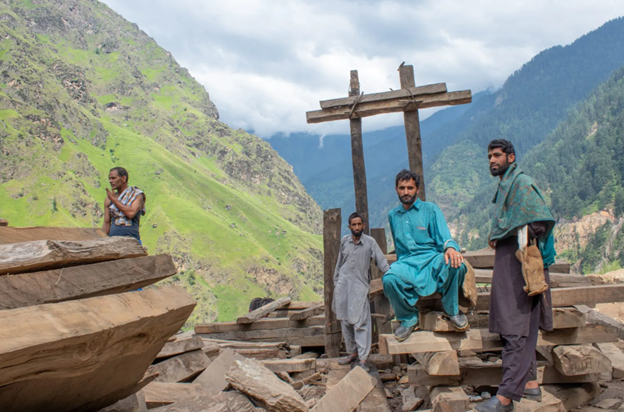
Another report soon followed after that an environmental activist, Rehamatullah Ahmed had also been booked under the PSA on Nov. 9, on charges of being an alleged “overground worker and sympathiser of militants” who posed a “threat to the security of the state.”
Authorities claimed that these individuals were trying to “obstruct projects of national importance.” However, local sources, activists and journalists on social media said that the detained activists were only raising concerns about growing health hazards and environmental damage linked to the construction of the hydropower projects.
These concerns include impacts on infrastructure, environmental violations, lack of compensation, and inadequate rehabilitation. Residents claimed project-related blasting caused significant damage to their homes and properties.
According to a report in The Wire, the detention of Rehamatullah might have also been connected to his video interview on Nov. 6, where he criticized the Doda deputy commissioner for not enforcing regulations on solid waste disposal in the town.
Rehamatullah exposed alleged fund misappropriation and neglect in handling local waste, which has had serious implications for public health and the environment.
Fayaz Ahmad, Rehmatullah’s elder brother, said that there was a knock on their door at around 5 am on the day of the arrest, “When my brother opened the door, the cops told him that he was wanted by one of their officers.”
Ahmad stated that a group of nearly 3 dozen police officers, including female personnel, cordoned their home before his brother was taken to the Doda police station.
Despite repeated warnings from environmentalists, geologists, and other experts about the risks associated with the unchecked expansion of these hydro-projects, the occupying government continues to prioritize these developments, often overlooking their ecological impact in favor of national interests. In the process, it is Kashmiris who suffer the consequences of such “development” and indians who reap the benefits.
According to G M Bhat, a geologist at Jammu University: “Chenab Valley is located in seismic zone 4, which is extremely vulnerable to powerful earthquakes that occur regularly … The government should construct small hydroelectric projects with tiny reservoirs, the water of which can be easily controlled, rather than creating big dams” (Kashmir Times, 2024).
22 additional individuals have also been placed under state “surveillance,” sparking concerns that they too could face arbitrary detention. These actions against civil activists have alarmed local communities, who perceive them as an attempt to stifle environmental advocacy and transparency efforts.
The Public Safety Act, described by Amnesty International as a “lawless law,” has been frequently employed in Jammu and Kashmir to suppress political dissent and criticism of the government.
More than 250 activists from india endorsed a statement issued by the National Alliance of People’s Movements (NAPM), denouncing the detention of the 6 activists.
The signatories called for the activists’ immediate release, emphasizing that they were merely exercising their legitimate right to voice ecological concerns.
The signatories condemned the government for promoting environmental protection on the global stage at the 29th United Nations Climate Change Conference (COP29) in Baku, Azerbaijan, while simultaneously arresting those advocating for climate action within the country.
The detention of these activists reflects a broader pattern of how india silences dissent in Kashmir. indian “development” has led to the destruction of Kashmiri lands and ecology, and dispossessed thousands of Kashmiris of their homes.
Development has long been used as grounds for land grabs and ecological colonialism. And india is no stranger to using that strategy in Kashmir.
Soon after, another incident occurred in Kishtwar on November 20. Four laborers from Kwath, a remote mountain village in Jammu’s Kishtwar district, were allegedly tortured in indian army’s custody. The civilians were summoned to the Chas Army Camp, an hour’s trek away, for questioning about suspected militant activity.
By evening, when they hadn’t returned, anxiety gripped the village. Villagers launched a search and found the men “dumped outside” the camp gates, severely injured. Their injuries were so severe that they couldn’t walk or speak.
The four men, all poor daily-wage laborers from the Kwath village, left for the Chas Army Camp on foot after the army called them in for questioning.
When they were found, villagers described their shocking state: bruises covered their bodies, and some were vomiting blood. One had severe eye injuries. Their families were horrified by the condition in which they returned, igniting outrage across the village.
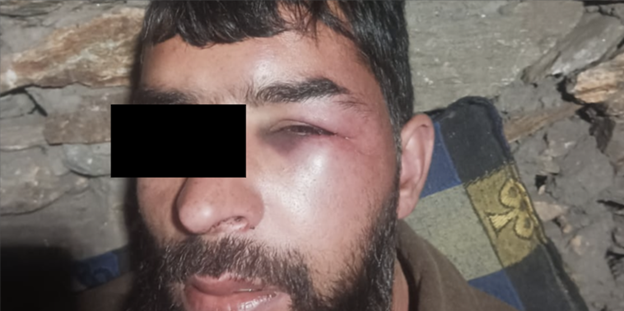 Irshad Ahmad, a carpenter who helped carry them back, said, “When I lifted their clothes, I was numb. They had been beaten ruthlessly.”
Irshad Ahmad, a carpenter who helped carry them back, said, “When I lifted their clothes, I was numb. They had been beaten ruthlessly.”
From Chas to Kwath, villagers took turns carrying them on foot across, determined to get them medical help.
Villagers stated they were discouraged from filing a police report and even attempts to get the injured medical treatment were initially thwarted by the army. First, village defence guards (VDGs) suggested they go to a smaller hospital with limited resources. When the villagers insisted on Kishtwar’s hospital, the army blocked their path, pressuring them to admit the men at an army facility instead. Villagers refused, saying their priority was proper treatment, not appeasement.
Medical examinations confirmed extensive physical trauma, indicating prolonged and brutal treatment. Dawood Ahmad, a resident, said: “[The army] told us not to press for an FIR and said they will get the issue resolved,” Dawood added that it was conveyed that the “brotherhood” would end if the villagers pursued the matter.
After the villagers’ outcry, the indian army issued a statement acknowledging reports of “ill-treatment” during a counter-terror operation. They announced an investigation and promised “necessary follow-up action.”
Members of the affected families allege that each of them was offered Rs 25,000, and families were promised help for three months following the incident.
This incident isn’t isolated. Last year, in Poonch district, three men allegedly died due to custodial torture. Moreover, this is also not the first time the army has initiated a probe into its own dubious activities. However, these investigations are mere appeasements and lead nowhere.
Villagers say the army accused the men taken into custody of failing to report militant activity in the area, but they reject these claims. Dawood Ahmad asked, “If militants were in the village, why didn’t the army come at that time?”
Moroever, the army’s payment to the families of the victims suggests that the army attempted to buy their silence.
The incident shines a light on the impunity with which the indian army acts in Kashmir. This is not the first time civilians have suffered at their hands. india’s army acts to instill a culture of fear and silence in Kashmir.
Kashmir LitFest Normalizes indian Occupation of Kashmir
On November 3, the Srikula Foundation announced the first edition of its Kashmir LitFest, to be held on 7th and 8th December.
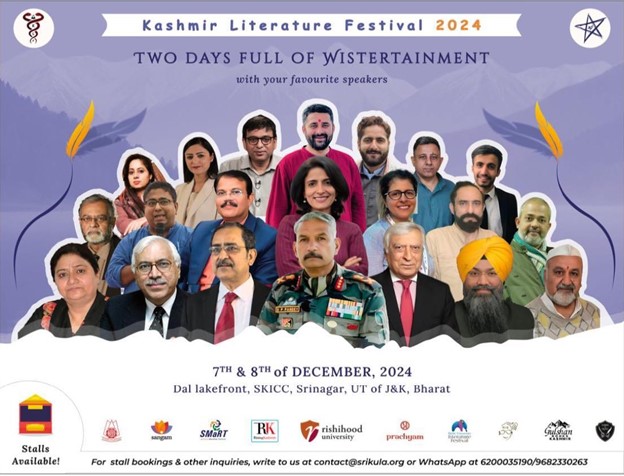 After releasing more information about its events, the festival faced criticism for its controversial line-up of army officials, collaborators and indians.
After releasing more information about its events, the festival faced criticism for its controversial line-up of army officials, collaborators and indians.
The first speaker announced on the festival’s Instagram page was Lt. Gen. D.P. Pandey. The festival’s decision to feature an army official not only ignores the indian army’s role in brutally occupying Kashmir, committing war crimes, and subjugating its people, but blatantly endorses it.
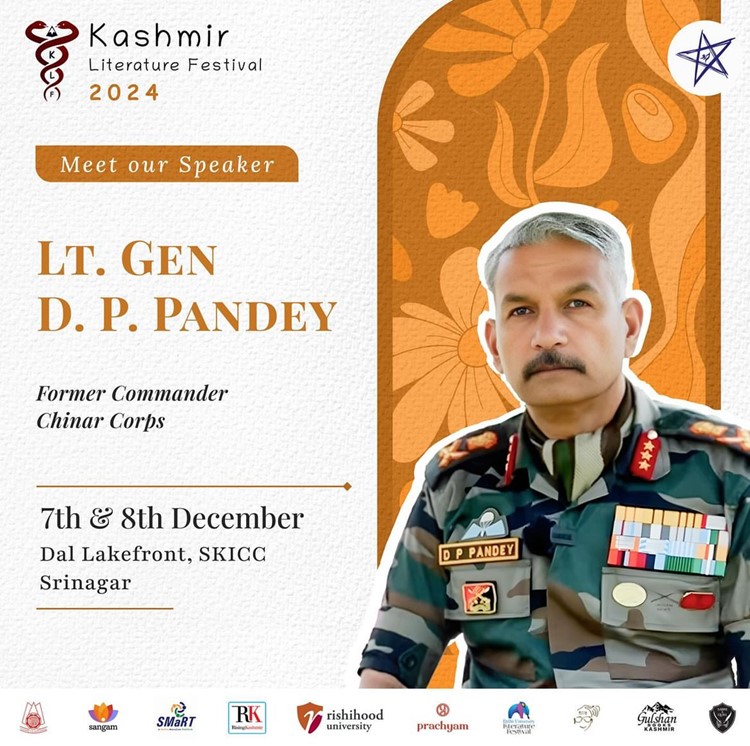
Moreover, the session in question was to be moderated by Shehla Rashid, a former “activist” who has taken to openly endorsing Modi and denying the plight of Kashmiris.
From the event’s selection of speakers, it is clear which people have been cherry-picked to speak on Kashmir. While india appoints its own Kashmiri representatives, the voices of journalists, academics and civil society across Kashmir- groups that should actually be discussing Kashmiri literature and arts- are silenced.
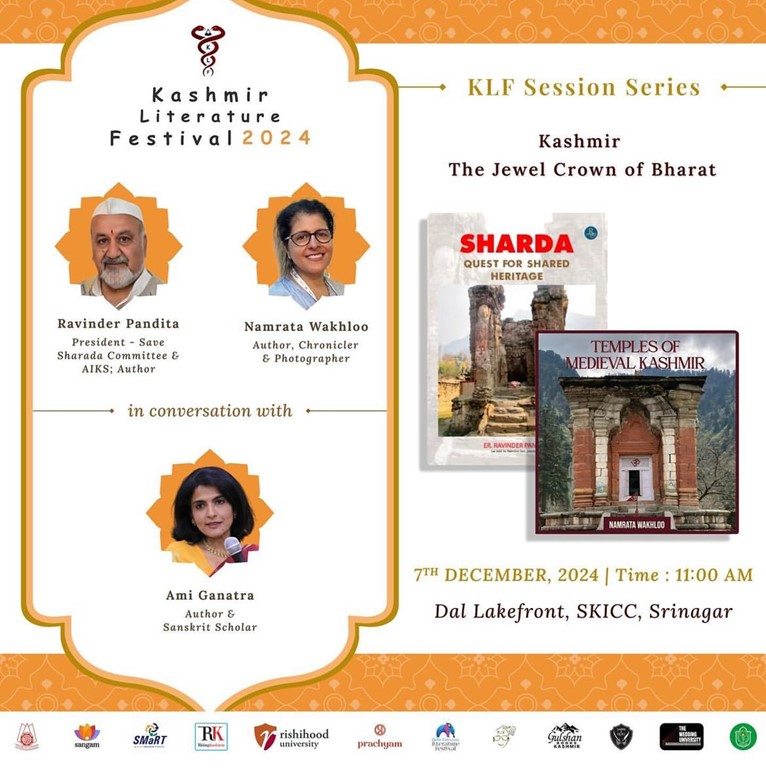 When called out for the event’s pro-india line-up on X, Shehla Rashid replied: “Better than those who have been organising terror, mistrust and mischief no?” Her response criminalizes legitimate Kashmiri resistance against india’s occupation and erases the role of indian propaganda in furthering indian colonial rule.
When called out for the event’s pro-india line-up on X, Shehla Rashid replied: “Better than those who have been organising terror, mistrust and mischief no?” Her response criminalizes legitimate Kashmiri resistance against india’s occupation and erases the role of indian propaganda in furthering indian colonial rule.
The festival also attempts to normalize that Kashmir is a part of india. One of the festival’s sessions is titled “Kashmir: The Jewel Crown of Bharat,” and solely emphasizes Kashmir’s Hindu history.
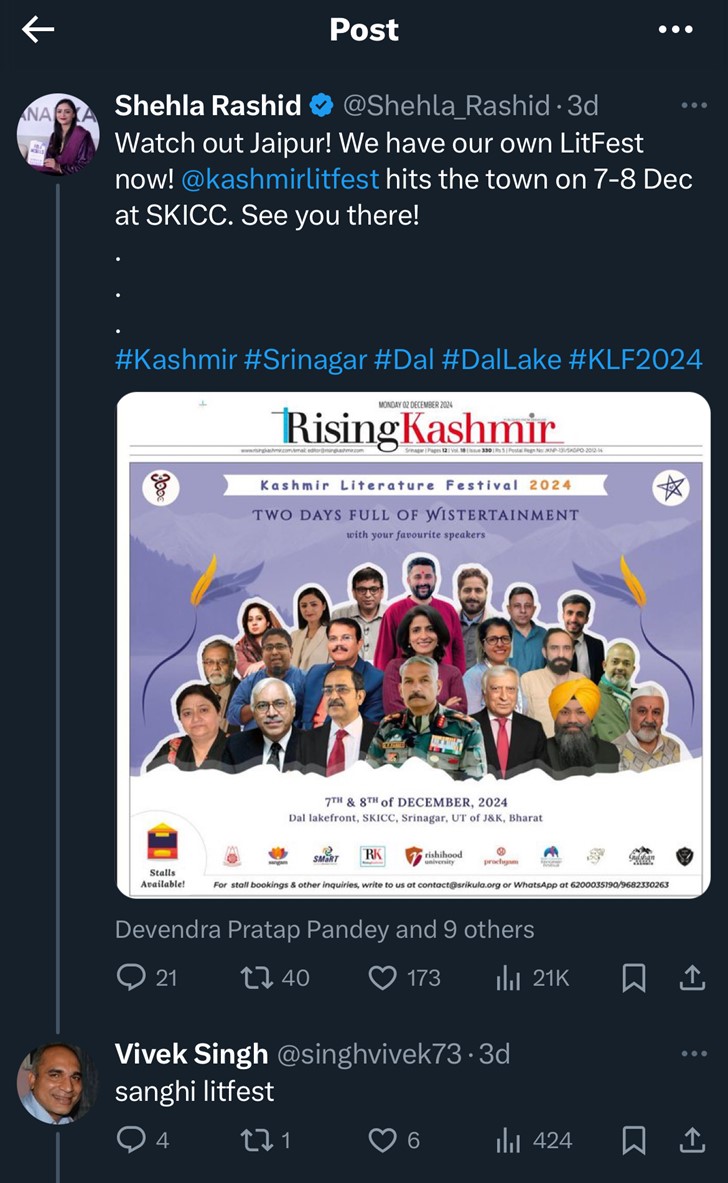
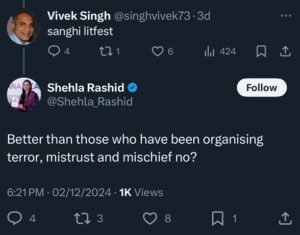
It also conflates indian and Kashmiri culture to reinforce the idea that Kashmir and india are one. In its cultural performances segment, the festival has scheduled a ‘Bharatnatyam Performance,’ a dance that is in no way indigenous to Kashmir and serves to further Hinduize the perception of the region.
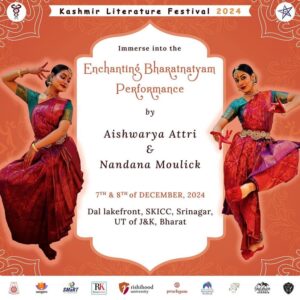 The festival’s website describes its vision as preserving “Bharat’s indigenous culture” and india from “colonialism.” Consequently, india’s history as a colony is used to deflect responsibility from india as Kashmir’s present day colonizer.
The festival’s website describes its vision as preserving “Bharat’s indigenous culture” and india from “colonialism.” Consequently, india’s history as a colony is used to deflect responsibility from india as Kashmir’s present day colonizer.
Moreover, the chairman of the Srikula Foundation, Yuvraj Srivastava, frequently refers to Kashmir a part of “ancient Bharatvarsha,” as “the land of Parvati,” and shares numerous images of the tricolor flag. In one Instagram post, he poses with a rack of guns and writes #indianarmy in the caption. Srivastava also has a history of posting islamophobic and pro-Modi tweets on X. In one particular tweet, he mocks the halal meat industry.
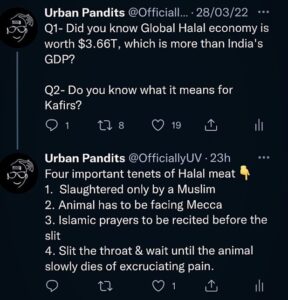
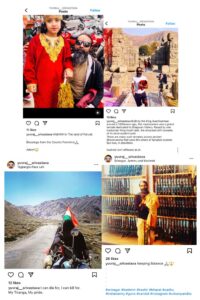 Looking at the festival’s leadership, clearly there is no real Kashmiri representation behind it.
Looking at the festival’s leadership, clearly there is no real Kashmiri representation behind it.
This is also not the first time india has used literary festivals to expand its colonial project in Kashmir. Last year, writers from all over india got together in Kashmir for a literary fest organized by Kumaon. The writers were predominantly Kashmiri Pandits who aligned with the colonial agenda of the indian state in Kashmir. The founder of the Kumaon LitFest also casually claimed Kashmir to be part of india, and urged people to “forget the past 30 years of conflict and talk about another side of Kashmir.” This blatant condoning and dismissal of the atrocities waged by the indian state in Kashmir is exactly why activities like these are facilitated by the indian state in Kashmir.
Similarly, Kashmir LitFest is another attempt at silencing Kashmiri dissidents by platforming those whose views align with india’s colonial agenda in Kashmir. Moreover, hosting a literature festival in a region that is undergoing active settler colonialism is a blatant attempt to portray normalcy.
india has resorted to using cultural and literary events to reinforce its colonial takeover of Kashmir and spread the myth that Kashmir and india are inseparable from one another.
Stay in touch with Stand with Kashmir.
Stand With Kashmir (SWK) is a Kashmiri-driven independent, transnational, grassroots movement committed to standing in solidarity with the people of indian-occupied Kashmir in ending the indian occupation of their homeland and supporting the right to self-determination of the pre-partition state of Jammu and Kashmir. We want to hear from you. If you have general inquiries, suggestions, or concerns, please email us at info@standwithkashmir.org.
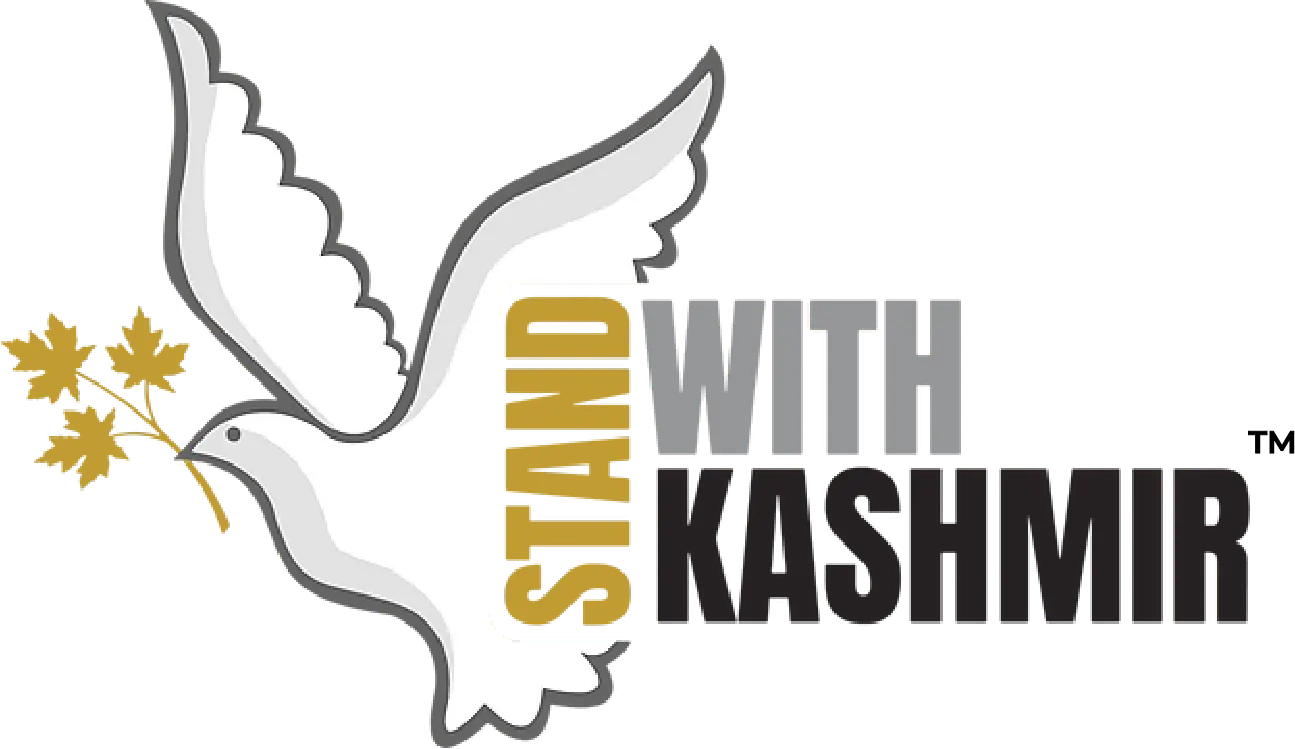

Leave a Reply